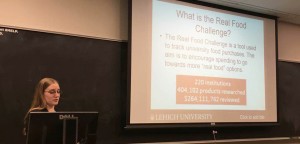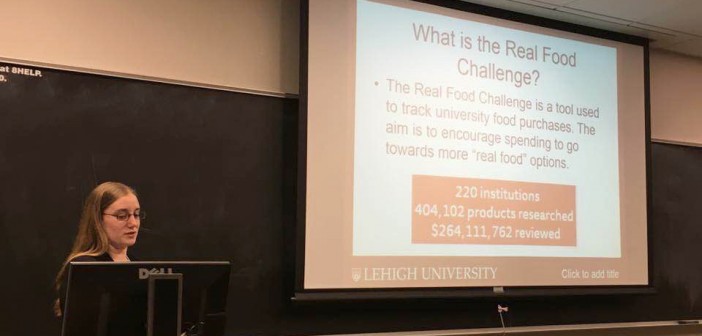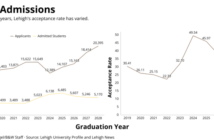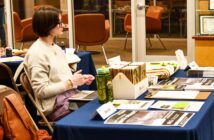
Teresita Liebel, ’17, presents on the Real Food Challenge at the Lehigh Valley Association of Independent Colleges (LVAIC) Sustainability Conference on Saturday, Feb. 20, 2016. The conference focused on pomoting sustainability on higher education campuses. (Courtesy of Kelsey Alpaio)
The Lehigh Valley Association of Independent Colleges hosted its third day-long sustainability conference since 2009, focusing on campus sustainability performances and practices at Lehigh.
The conference was held in STEPS and included keynote speakers, sustainability-themed presentations, workshops, poster sessions and an exhibitor forum.
Delicia Nahman, Lehigh’s sustainability officer, said there was a lot of excitement surrounding the conference but provided no specific commitment on when the conference would be held again. After discussing the importance of sustainability, Lehigh decided to host a second conference in 2014 and then, subsequently, every other year.
Lehigh Valley campuses have worked to improve sustainability by focusing on issues in food systems and food security, Nahman said. They have started community gardens or farms and share the best practices. She said there is also movement around energy efficiency.
Kelsey Alpaio, a graduate assistant in the Office of Sustainability, led a poster presentation on her work with Energy Conservation Month. She planned multiple events to engage the campus in energy conservation.
Events around campus included an online energy pledge, Unplugged Open Mic Night and Sweater Day, which encouraged students and faculty to wear sweaters instead of turning the heat up because heat drains the most energy on campus, according to Alpaio.
“We have to think that sustainability is leaving the world the same or better than how you found it,” Alpaio said. “If we want to improve for a better world for our children, we have to be thinking about these things now.”
Graduate student Shawn Wang spoke about the Sustainability Tracking, Assessment and Rating System, a data collection system that is organized into a report rating Lehigh’s sustainability. Teresita Liebel, ’17, presented The Real Food Challenge, which focused on Lehigh’s food options, such as dining halls and determining if food is organic.
Lehigh has worked toward energy efficiency by renovating spaces around campus to achieve Leadership in Energy and Environmental Design, or LEED, statuses. This rating system evaluates the environmental performance of a building and encourages transformation toward sustainable designs.
The STEPS building was the first Lehigh building to achieve gold LEED status, Nahman said, followed by the newly renovated Williams Hall, which achieved silver LEED status.
Although STEPS uses the highest amount of energy on campus because of the number of labs in the building, it has the most energy-efficient systems that mitigates the amount of energy it would have used without the system, Nahman said.
Lehigh also has a number of waste-management programs to divert waste, a new bike-sharing program called Zagster and a car sharing program partnered with Enterprise.
Andrew Hatten, an exhibitor spokesman at the conference, said Enterprise implemented a car-sharing program at Lehigh six years ago. The program focuses on the use of hybrid cars and a new carpool-match called Zimride.
Hatten said that the rental cars on campus aims to decrease the need for students to bring cars on campus.
Enterprise’s newest ride-sharing program allows faculty and staff to have their own carpool services. This new service has been applied in Pennsylvania but not yet at Lehigh. Nahman said they hope to bring it to Lehigh soon.
Lafayette students Emilie Henry, ’19, and Praphulla Pokaharel, ’19, attended the conference to see what goes on around different college campuses and to take away ideas they can implement on their campus.
“We are too narrow-minded and not focused on how we affect the Earth, and I don’t think we realize how privileged we are,” Henry said. “We need to realize we are impacting the Earth and how we are constantly interacting with it.”
This spring, Lehigh will launch its second campus sustainability plan for 2020 and explain future sustainability goals.






Comment policy
Comments posted to The Brown and White website are reviewed by a moderator before being approved. Incendiary speech or harassing language, including comments targeted at individuals, may be deemed unacceptable and not published. Spam and other soliciting will also be declined.
The Brown and White also reserves the right to not publish entirely anonymous comments.